Top 40 Database Administrator Interview Questions
Preparing for a Database Administrator interview requires knowledge of various tools, problem-solving skills, and database management best practices. This list of 40 questions covers key topics that will help you showcase your expertise and readiness for the role, from technical experience to handling performance issues.
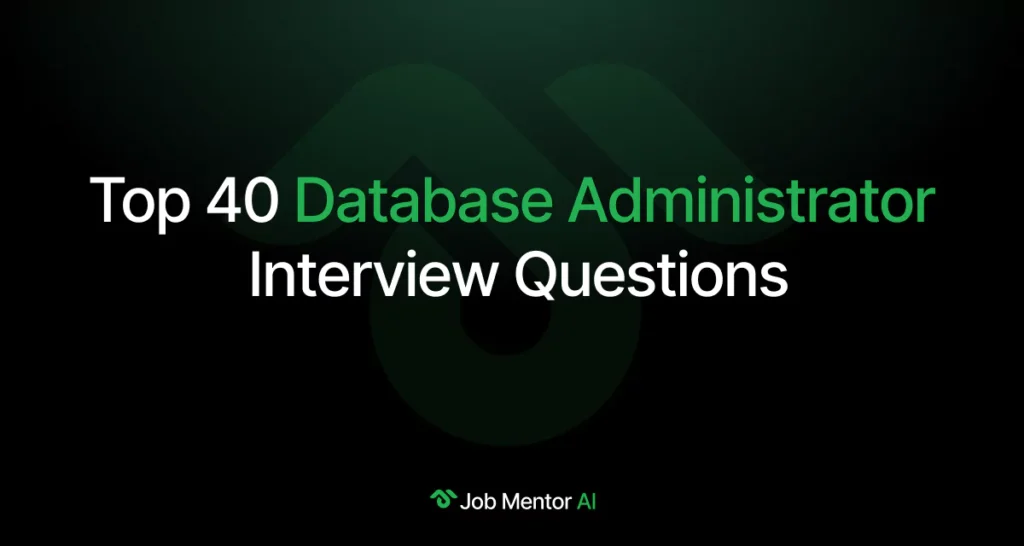
40 Must Know Database Administrator Interview Questions
Introduction Phase of Database Administrator Interview Questions
1. Tell me about yourself.
2. Why did you choose to become a Database Administrator?
3. What are your strengths as a DBA?
4. What are your weaknesses?
5. Where do you see yourself in five years?
Background and Experience of Database Administrator Interview Questions
1. What types of databases have you worked with?
2. Can you describe a recent database project you worked on?
3. How do you ensure data integrity in your databases?
4. Have you worked with large data sets or high-traffic environments?
5. How do you handle database backup and recovery?
Database Design & Modeling Database Engineer Interview Questions
1. What is a relational database model?
2. What is a data warehouse?
3. What is OLAP and how is it used in a data warehouse?
4. What is a foreign key and how does it work?
5. What are the different types of relationships in a relational database?
Technical Database Administrator interview question
1. What is database normalization, and why is it important?
2. What is the difference between a clustered and a non-clustered index?
3. How do you handle database backups?
4. What is a foreign key, and why is it important in a relational database?
5. How do you optimize SQL queries for performance?
Behavioral and Situational Database Administrator Interview Questions
1. Tell me about a time you had to deal with a database outage.
2. How do you prioritise tasks when managing multiple database issues?
3. Describe a time you disagreed with a team member on a database solution.
4. Have you ever made a mistake that affected a database? What did you learn?
5. How do you keep up with changes in database technology?
Technical/Tools Expertise Database Administrator Interview Questions
1. What database monitoring tools have you used?
2. What experience do you have with scripting or automation?
3. How comfortable are you with cloud databases?
4. What’s your approach to indexing a large database?
5. How do you manage user roles and permissions?
Performance-Based Database Administrator Interview Questions
1. How do you identify and fix slow-running queries?
2. Describe a time you improved database performance.
3. How do you handle database replication and syncing across servers?
4. How do you ensure your databases scale with growing data and users?
5. How do you test changes before applying them to a production database?
Problem-Solving and Analytical Thinking Database Administrator Interview Questions
1. How do you approach diagnosing a performance drop reported by users?
2. What would you do if a critical backup failed overnight?
3. How do you handle unexpected data corruption?
4. A developer complains that a query runs fine locally but is slow in production. What do you check?
5. How do you decide whether to denormalise a database?
Introduction Phase of Database Administrator Interview Questions
This section of Database Administrator interview questions focuses on your background, key skills, and motivation for the role. It helps interviewers understand your experience, strengths, and passion for managing reliable and secure database systems.
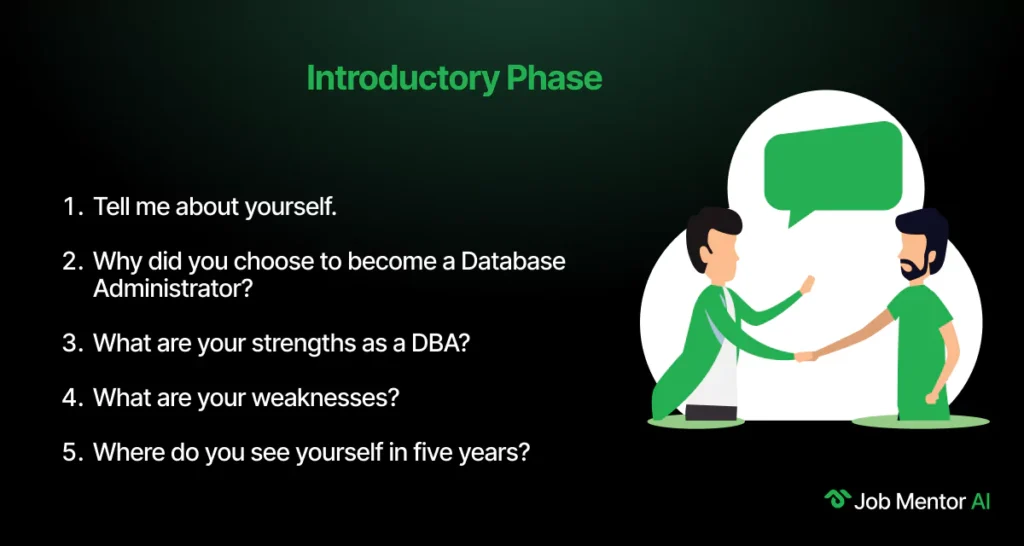
1. Tell me about yourself.
What Interviewers Want:
A clear summary of your background, key database skills, and what interests you about the DBA role.
Strong Answer:
“I earned a computer science degree and have three years of hands-on experience as a DBA working mainly with SQL Server and MySQL. I’ve focused on performance tuning, backups, and ensuring high availability. I’m passionate about keeping data systems reliable, secure, and optimized to support business operations.”
Poor Answer:
“I have a degree in computer science and worked with databases in my last job. I like data and solving problems.”
2. Why did you choose to become a Database Administrator?
What Interviewers Want:
A sense of passion and genuine interest in databases, with a clear reason for entering the field.
Strong Answer:
“I became interested in databases during my university coursework, where I enjoyed learning how structured data could support real-world decisions. The logic, precision, and importance of the role drew me in. I love solving complex problems and ensuring systems run smoothly and securely every day.”
Poor Answer:
“I liked working with computers, and databases seemed like a good area to try out.”
3. What are your strengths as a DBA?
What Interviewers Want:
Specific technical and soft skills that match the role, such as performance, security, and attention to detail.
Strong Answer:
“My core strengths include query optimisation, backup and recovery processes, and managing security roles in large-scale databases. I’m highly detail-oriented, enjoy analysing root causes of performance issues, and excel at creating reliable systems that meet both technical and business needs.”
Poor Answer:
“I’m good at working with databases and fixing stuff. People say I’m a fast worker.”
4. What are your weaknesses?
What Interviewers Want:
An honest answer showing self-awareness and efforts to improve a real but manageable weakness.
Strong Answer:
“Earlier in my career, I found it hard to delegate because I wanted everything to be perfect. Over time, I realized teamwork is more effective, so I’ve worked on communication and trust with colleagues, which has helped improve collaboration and overall project efficiency.”
Poor Answer:
“I sometimes get bored when there’s not much work to do or when I have to do repetitive tasks.”
5. Where do you see yourself in five years?
What Interviewers Want:
Long-term career goals that show commitment to the field and growth potential.
Strong Answer:
“In five years, I aim to be a senior database administrator managing cloud-based systems and leading database strategy for my team. I also plan to earn certifications in AWS and Oracle to stay ahead in the field and support the company’s growth through scalable and secure data solutions.”
Poor Answer:
“I’m not sure, maybe in a better job or trying something different in IT.”
Background and Experience of Database Administrator Interview Questions
This section covers essential Database Administrator interview questions related to your hands-on experience with various database systems, real-world projects, and practices for managing large datasets, backups, and data integrity. It helps employers assess your technical capability and how well you’ve applied your knowledge in practical scenarios.
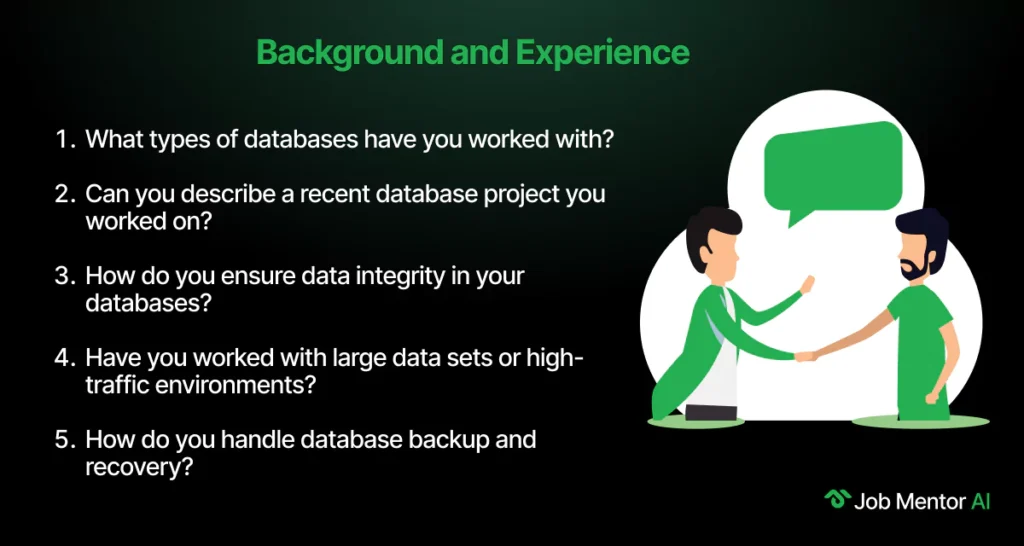
6. What types of databases have you worked with?
What Interviewers Want:
Understanding of your hands-on experience with specific database systems like MySQL, Oracle, SQL Server, PostgreSQL, etc.
Strong Answer:
“I’ve worked with MySQL and SQL Server in production environments, managing tasks like query tuning, replication, and backup strategies. I’ve also had some experience with PostgreSQL and Oracle for smaller projects, which helped me understand differences in performance and architecture.”
Poor Answer:
“I’ve used MySQL and some Oracle before in past jobs. I also know a bit of SQL Server.”
7. Can you describe a recent database project you worked on?
What Interviewers Want:
Your ability to plan, execute, and explain your contribution to a real-world database project.
Strong Answer:
“I led a project to migrate a client’s on-premises SQL Server database to AWS RDS. This involved schema redesign, data validation, and implementing a rollback plan. The migration improved performance and cut costs by 20%, and I documented every step for future reference.”
Poor Answer:
“I helped with a database migration once. It was a team project, and I worked on parts of it.”
8. How do you ensure data integrity in your databases?
What Interviewers Want:
Knowledge of database design principles, constraints, and practices that protect data accuracy and consistency.
Strong Answer:
“I apply proper primary and foreign key constraints, implement check constraints, use transactions for critical operations, and follow normalisation principles during design. I also schedule regular data audits and automate alerts for anomalies or violations in integrity rules.”
Poor Answer:
“I use backups and avoid letting people change things directly unless needed.”
9. Have you worked with large data sets or high-traffic environments?
What Interviewers Want:
Ability to manage performance, reliability, and security in demanding environments with large-scale data.
Strong Answer:
“Yes, I managed a high-traffic e-commerce site database with over 50 million records. I optimised queries, partitioned tables, and used indexing strategies to reduce response time. I also monitored performance using tools like SQL Profiler and implemented regular indexing plans.”
Poor Answer:
“Yes, I worked on a big database once that had a lot of data and needed faster queries.”
10. How do you handle database backup and recovery?
What Interviewers Want:
Knowledge of backup types, frequency, storage, testing, restores, and disaster recovery planning.
Strong Answer:
“I implement full, differential, and transaction log backups depending on data change frequency. I store backups off-site using encrypted storage and test restores quarterly. I also create recovery plans with RTO and RPO defined to ensure minimal downtime in case of failure.”
Poor Answer:
“I usually just set up automatic backups and make sure they run daily.”
Explore these helpful interview question guides
Technical Database Administrator interview question
The technical part of Database Administrator interview questions focuses on your knowledge of key database concepts, performance optimisation, and security. Interviewers expect you to explain topics like normalization, indexing, backups, and data integrity. Showing experience with migrations, query tuning, and advanced techniques like sharding highlights your ability to manage efficient and secure databases.
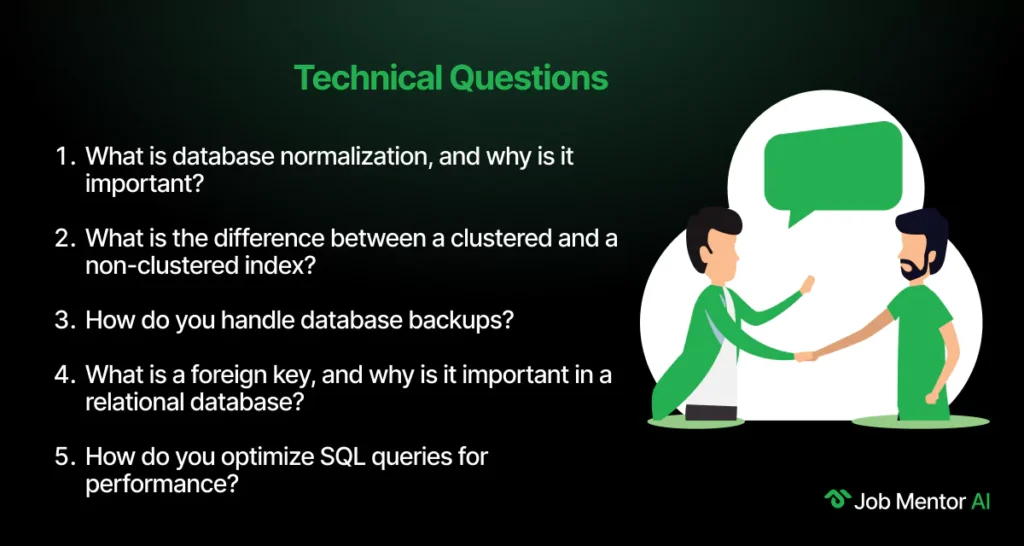
11. What is database normalization, and why is it important?
What Interviewers Want:
Understanding of the importance of reducing data redundancy and ensuring data integrity.
Strong Answer:
“Normalization is the process of organizing data to reduce redundancy and dependency. It’s done by dividing large tables into smaller, manageable ones and ensuring relationships between them. The main goal is to maintain data integrity, reduce anomalies, and make updates more efficient.”
Poor Answer:
“Normalization makes databases smaller and faster.”
12. What is the difference between a clustered and a non-clustered index?
What Interviewers Want:
Knowledge of indexing techniques and their impact on performance.
Strong Answer:
“A clustered index determines the physical order of data in a table, and there can only be one per table. A non-clustered index, however, stores a separate structure with pointers to the data. Non-clustered indexes help with query speed but don’t affect the physical storage of data.”
Poor Answer:
“A clustered index sorts data while a non-clustered index just helps find data faster.”
13. How do you handle database backups?
What Interviewers Want:
Experience with backup strategies, types, and restoration procedures.
Strong Answer:
“I use a combination of full, differential, and transaction log backups. Full backups are scheduled weekly, differential daily, and log backups every hour for critical systems. I ensure that backups are stored off-site and routinely test restoration procedures to ensure data recovery during failures.”
Poor Answer:
“I run backups once a day. If something goes wrong, I restore it.”
14. What is a foreign key, and why is it important in a relational database?
What Interviewers Want:
Understanding of database relationships and enforcing data integrity.
Strong Answer:
“A foreign key is a field in one table that uniquely identifies a row of another table. It enforces referential integrity by ensuring that a record in one table corresponds to an existing record in another, preventing orphaned data and maintaining relationships between entities.”
Poor Answer:
“It’s just a way to link tables.”
15. How do you optimize SQL queries for performance?
What Interviewers Want:
Knowledge of query optimisation techniques and tools for improving performance.
Strong Answer:
“I analyse execution plans to identify bottlenecks like missing indexes, inefficient joins, or poor query structure. I then rewrite queries, use indexing strategies like composite indexes, and apply techniques such as query refactoring and avoiding SELECT * to limit returned data.”
Poor Answer:
“I just make sure queries are simple and use indexes.”
16. Explain ACID properties in database systems.
What Interviewers Want:
Understanding of database transaction properties and ensuring data integrity.
Strong Answer:
“ACID stands for Atomicity, Consistency, Isolation, and Durability. Atomicity ensures transactions are fully completed or not at all. Consistency ensures the database remains in a valid state before and after a transaction. Isolation ensures that concurrent transactions do not affect each other. Durability guarantees that once a transaction is committed, it’s permanent.”
Poor Answer:
“ACID ensures that transactions are processed without errors.”
17. What are stored procedures, and how do they improve database performance?
What Interviewers Want:
Experience with stored procedures and their impact on efficiency.
Strong Answer:
“Stored procedures are precompiled SQL statements that can be executed on demand. They improve performance by reducing the amount of information sent between the application and the database. They also allow for better security by controlling data access and reducing SQL injection risks.”
Poor Answer:
“Stored procedures are just reusable queries.”
18. How would you handle a database migration to a new version?
What Interviewers Want:
Experience with database version upgrades and migration planning.
Strong Answer:
“I would first review the new version’s release notes and identify any deprecated features or changes. I’d test the migration process in a non-production environment, perform a full backup, and migrate data and schema changes. After migration, I’d run thorough tests and monitor performance closely for any issues.”
Poor Answer:
“I would just install the new version and migrate the data.”
19. How do you ensure data security in a database environment?
What Interviewers Want:
Awareness of security measures and best practices.
Strong Answer:
“I implement access control by using roles and permissions based on the principle of least privilege. I also use encryption for data at rest and in transit, and ensure that sensitive data is masked. Regular security audits and monitoring for potential breaches are also part of my strategy.”
Poor Answer:
“I make sure users don’t have access to data they shouldn’t.”
20. What is database sharding, and when would you use it?
What Interviewers Want:
Understanding of advanced database partitioning techniques for scalability.
Strong Answer:
“Sharding is a technique where large databases are divided into smaller, more manageable pieces called shards, each stored on separate servers. It helps scale horizontally by distributing data across multiple machines. I’d use sharding when a database needs to handle large amounts of data or traffic that can’t be managed by a single server.”
Poor Answer:
“Sharding splits the database for better performance.”
Behavioral and Situational Database Administrator Interview Questions
Database Administrator interview questions often cover behavioral and situational scenarios to evaluate how candidates respond to challenges on the job. These questions help employers understand your problem-solving skills, teamwork, communication, and ability to manage critical situations effectively.
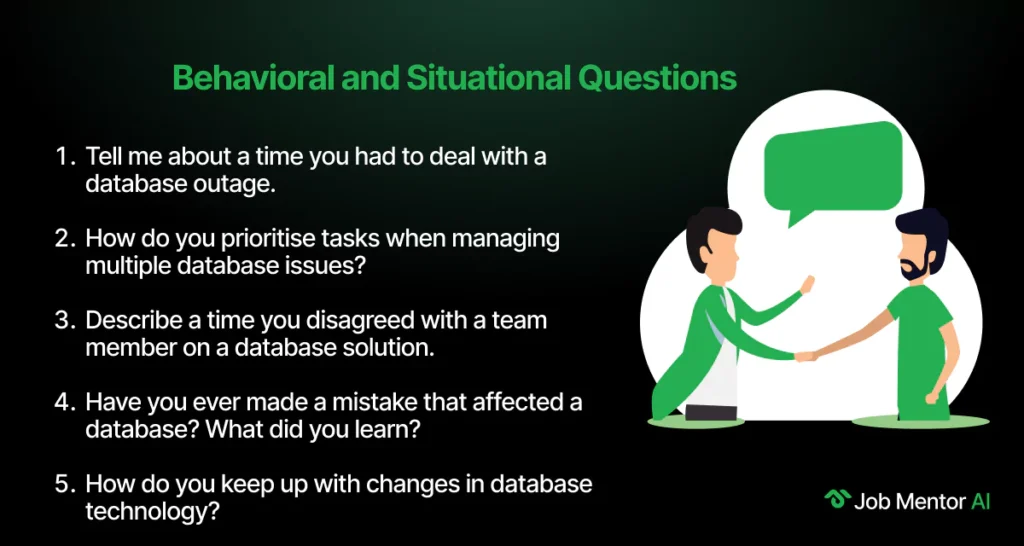
21. Tell me about a time you had to deal with a database outage.
What Interviewers Want:
How you respond under pressure, your troubleshooting approach, and your communication skills during critical incidents.
Strong Answer:
“During an unexpected outage, I quickly identified that a corrupted index was causing locking issues. I isolated the problem, restored the latest backup on a test server, rebuilt the index, and then applied the fix in production. I kept stakeholders updated until services were fully restored.”
Poor Answer:
“We had an outage once. I checked the server, restarted it, and it worked after that.”
22. How do you prioritise tasks when managing multiple database issues?
What Interviewers Want:
Your time management and decision-making skills when facing competing responsibilities.
Strong Answer:
“I assess the impact of each issue, prioritising those affecting production or end-users. I categorise issues as critical, high, or low priority, then document progress. I also communicate timelines with the team and ensure routine tasks are automated to save time for urgent matters.”
Poor Answer:
“I try to fix whatever seems most urgent at the moment and move on from there.”
23. Describe a time you disagreed with a team member on a database solution.
What Interviewers Want:
Your ability to work collaboratively, respect others’ opinions, and make data-driven decisions.
Strong Answer:
“A colleague preferred using a less secure method for faster performance. I suggested an alternative that balanced security and speed. We ran performance tests to compare outcomes. My approach proved more effective, and we agreed to implement it with added monitoring in place.”
Poor Answer:
“We didn’t agree on how to do something, but I just did it my way in the end.”
24. Have you ever made a mistake that affected a database? What did you learn?
What Interviewers Want:
Accountability, problem-solving, and a focus on learning from experience.
Strong Answer:
“Early in my career, I accidentally ran a delete query without a WHERE clause. Luckily, I had just backed up the database and was able to restore it. That incident taught me to always double-check queries in a staging environment and to use transactions for critical data changes.”
Poor Answer:
“I once deleted something by mistake, but it wasn’t a big deal. I fixed it quickly.”
25. How do you keep up with changes in database technology?
What Interviewers Want:
Your initiative and commitment to continuous learning and staying current in your field.
Strong Answer:
“I regularly follow database forums, read release notes from Oracle and Microsoft, and take part in webinars. I’ve completed certifications and subscribe to newsletters like Database Weekly. Staying updated helps me apply new features and security practices to my current work.”
Poor Answer:
“I watch YouTube videos sometimes and check blogs when I need to learn something.”
Technical/Tools Expertise Database Administrator Interview Questions
Database Administrator interview questions often test your technical and tools expertise. Employers want to see your hands-on experience with monitoring tools, scripting, cloud databases, indexing strategies, and security management to ensure smooth and secure database operations.
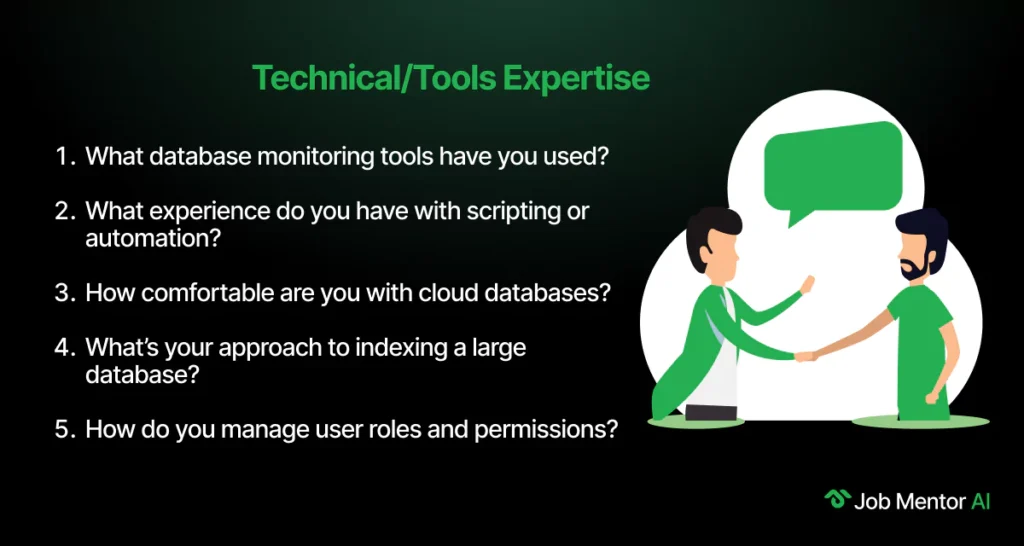
26. What database monitoring tools have you used?
What Interviewers Want:
Familiarity with database monitoring tools and how you use them to ensure performance and availability.
Strong Answer:
“I’ve used tools like SQL Server Profiler, SolarWinds DPA, and New Relic for performance monitoring and identifying slow queries. I set up alerts for CPU usage, long-running queries, and I/O bottlenecks. These tools help maintain uptime and optimise performance across environments.”
Poor Answer:
“I’ve used a few tools like SQL Profiler. I just use whatever the company provides.”
27. What experience do you have with scripting or automation?
What Interviewers Want:
Experience using scripts for automating routine tasks like backups, monitoring, and data import/export.
Strong Answer:
“I regularly use T-SQL and PowerShell to automate database backups, health checks, and maintenance plans. I’ve written scripts to automate user permissions audits, and I use cron jobs or SQL Agent to schedule tasks. Automation has helped reduce errors and save time significantly.”
Poor Answer:
“I’ve written a few SQL scripts. I prefer doing things manually most of the time.”
28. How comfortable are you with cloud databases?
What Interviewers Want:
Experience with cloud services like AWS, Azure, or Google Cloud for managing databases.
Strong Answer:
“I’ve managed databases on AWS RDS and Azure SQL Database. I’ve configured backups, security groups, and multi-AZ failovers. Cloud platforms allow better scalability, and I’ve worked on migrating on-prem databases to the cloud using tools like AWS DMS and Azure Database Migration Service.”
Poor Answer:
“I’ve heard of AWS and Azure but haven’t worked with them much yet.”
29. What’s your approach to indexing a large database?
What Interviewers Want:
Understanding of indexing strategy, performance tuning, and query optimisation.
Strong Answer:
“I start by analysing slow queries using execution plans. I identify missing or unused indexes and review the most frequent queries. I implement clustered and non-clustered indexes, filtered indexes where applicable, and ensure they don’t add unnecessary overhead to write operations.”
Poor Answer:
“I usually just add indexes where I think they’re needed or when queries seem slow.”
30. How do you manage user roles and permissions?
What Interviewers Want:
Knowledge of security best practices related to database access control and role management.
Strong Answer:
“I follow the principle of least privilege. I create database roles and assign permissions based on job functions, not individuals. I perform regular audits, revoke outdated access, and log all permission changes. For sensitive data, I also implement encryption and multi-factor authentication.”
Poor Answer:
“I just give access when someone asks and remove it if not needed anymore.”
Performance-Based Database Administrator Interview Questions
Database Administrator interview questions often include performance-based queries to evaluate how well you diagnose and improve database efficiency, handle replication, and plan for scalability. Employers want to see your practical approach to optimizing and maintaining database performance under real-world conditions.
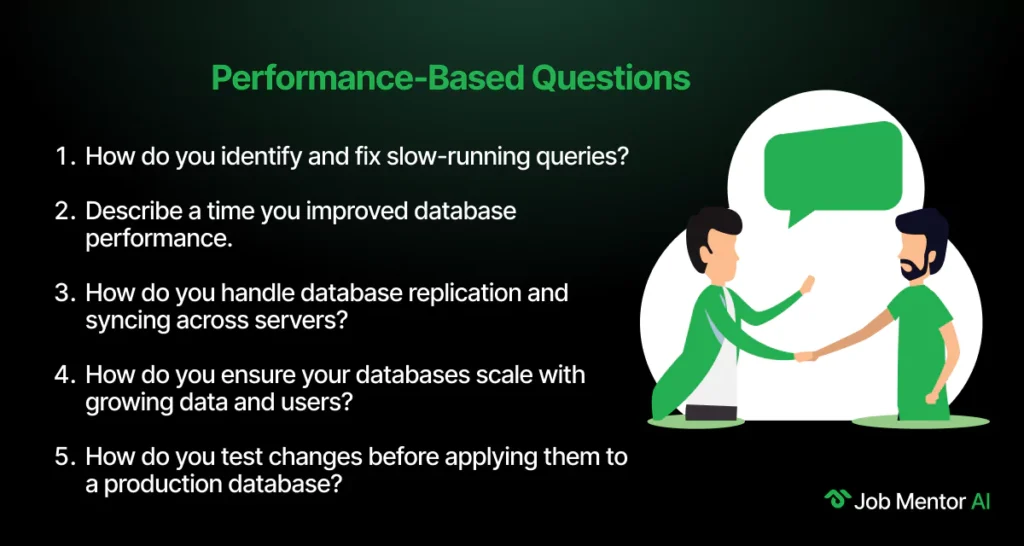
31. How do you identify and fix slow-running queries?
What Interviewers Want:
A solid process for analysing query performance and implementing improvements.
Strong Answer:
“I use tools like SQL Profiler, EXPLAIN plans, and DMVs to identify slow queries. I examine joins, filters, and indexes used. I rewrite queries for efficiency, create or adjust indexes, and use stored procedures for repeated operations. I also test changes in staging before deploying to production.”
Poor Answer:
“I look for slow queries and try to change them or add indexes.”
32. Describe a time you improved database performance.
What Interviewers Want:
Proof that you can analyse, act, and deliver performance gains.
Strong Answer:
“A reporting database had frequent timeouts. I reviewed the execution plans and found missing indexes and heavy tempdb use. I created proper indexes, reduced subqueries, and improved tempdb configuration. Report load time went from 60 seconds to under 10, with no added hardware.”
Poor Answer:
“I once updated indexes on a slow database, and it ran better afterward.”
33. How do you handle database replication and syncing across servers?
What Interviewers Want:
Knowledge of replication types and maintaining consistency across systems.
Strong Answer:
“I’ve set up transactional and snapshot replication in SQL Server for reporting purposes. I ensure the publisher and subscribers are in sync, monitor latency, and resolve conflicts when they arise. I also use log shipping and always test replication setups in dev before production rollout.”
Poor Answer:
“I’ve used replication a few times but mostly just followed tutorials.”
34. How do you ensure your databases scale with growing data and users?
What Interviewers Want:
A proactive approach to capacity planning and scalable design.
Strong Answer:
“I plan for scalability by partitioning large tables, using indexing strategies, and separating reads/writes when possible. I implement connection pooling and monitor system metrics. I also explore sharding and leverage cloud scalability options like read replicas or horizontal scaling when needed.”
Poor Answer:
“I add more storage or RAM when the server slows down and try to make queries faster.”
35. How do you test changes before applying them to a production database?
What Interviewers Want:
Best practices around testing, change management, and risk mitigation.
Strong Answer:
“I clone the production database to a staging environment, run all scripts, test performance, and validate results with sample data. I involve developers or QA for validation and use version control for scripts. Changes are deployed via CI/CD with rollback plans if any issues occur post-deployment.”
Poor Answer:
“I try to be careful and test things as I go. I usually just make sure the change works.”
Problem-Solving and Analytical Thinking Database Administrator Interview Questions
Database Administrator interview questions often test your problem-solving and analytical skills by exploring how you handle performance issues, backup failures, and data corruption. Interviewers want to see your structured approach, technical knowledge, and communication skills during critical situations
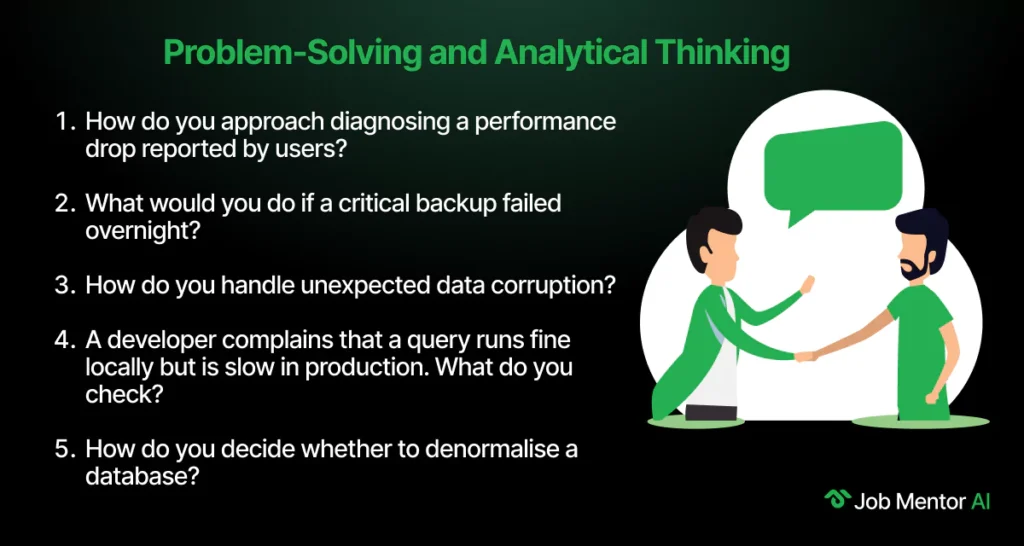
36. How do you approach diagnosing a performance drop reported by users?
What Interviewers Want:
Structured thinking, technical depth, and the ability to communicate with stakeholders.
Strong Answer:
“I start by confirming user reports, checking server logs, and monitoring CPU, memory, and I/O metrics. I review recent deployments, query performance, and wait stats. If needed, I roll back recent changes. I also update stakeholders regularly and document the cause and resolution process.”
Poor Answer:
“I check the database for issues and try to fix whatever seems wrong.”
37. What would you do if a critical backup failed overnight?
What Interviewers Want:
Crisis management skills, backup strategy knowledge, and a preventive mindset.
Strong Answer:
“I’d immediately attempt a manual backup while checking why the scheduled one failed, disk space, network issues, or script errors. I alert stakeholders, validate other backups for integrity, and revise the backup job. I also implement monitoring to alert us immediately on future failures.”
Poor Answer:
“I would try running the backup again and hope it works the second time.””I try to fix whatever seems most urgent at the moment and move on from there.”
38. How do you handle unexpected data corruption?
What Interviewers Want:
Risk awareness, recovery strategy, and quick decision-making skills.
Strong Answer:
“I isolate the affected area to prevent further damage, check logs to trace the cause, and restore from the most recent valid backup. I verify data consistency post-restore and then identify root causes, such as hardware or software failures, and take corrective action to prevent recurrence.”
Poor Answer:
“I try to repair the corrupted data manually and hope the rest is okay.”
39. A developer complains that a query runs fine locally but is slow in production. What do you check?
What Interviewers Want:
Attention to detail, systems knowledge, and collaborative problem-solving.
Strong Answer:
“I’d compare the execution plans from both environments, check if indexes differ, and ensure both have similar statistics and data volumes. I also look at server configurations and isolation levels. I collaborate with the developer to test adjustments before rolling them out to production.”
Poor Answer:
“I’d tell them to optimise the query again. Maybe it’s just a production issue.”
40. How do you decide whether to denormalise a database?
What Interviewers Want:
Balanced thinking between performance and data integrity.Your initiative and commitment to continuous learning and staying current in your field.
Strong Answer:
“I consider denormalisation when read-heavy systems suffer due to too many joins or complex queries. I weigh performance gain against storage costs and data redundancy. I test performance in staging and ensure strict procedures or triggers to maintain data consistency across duplicated fields.”
Poor Answer:
“If normalisation causes performance issues, I just denormalise the tables.”
Boost Your Interview with AI Interview Assistant
Take your interview preparation to the next level with the power of AI Live Interview Assist. This innovative tool listens to the interviewer’s questions, converts them into text, and instantly provides you with relevant and well-crafted answers. It’s designed to help you respond confidently and effectively in real-time. Additionally, AI Interview Answer Generator goes beyond simple question-answering by offering tailored questions based on the specific role you’re applying for. This ensures that you are prepared for all possible scenarios, allowing you to showcase your skills and expertise in the best light. With these advanced tools, you can make your interview experience smoother, more efficient, and more successful.
Top 40 Database Administrator Interview Questions
Table of Contents
Recommended Blogs
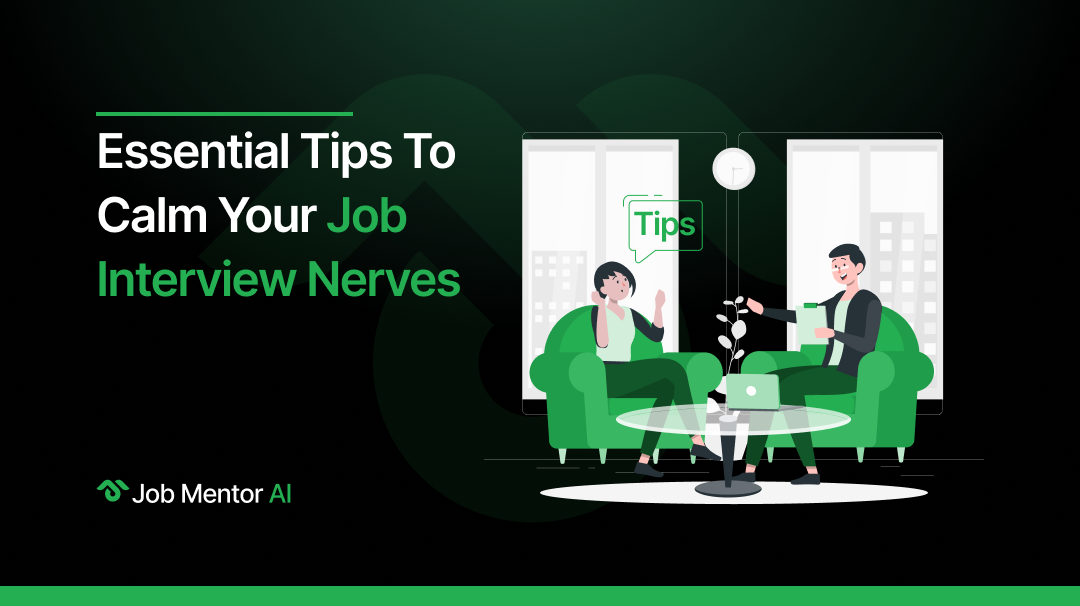
Essential Tips to Calm Your Job Interview Nerves
- Guide

15 Tough Sales Interview Questions with Sample Answers 2025
- Guide

How to Respond to an Interview Request (With Examples & Email Templates)
- Guide

What to Wear for a Job Interview: A Complete Style Guide for 2025
- Guide

What to Expect in a Second Interview: Key Interview Tips
- Guide

Resume vs. Cover Letter with Templates and Examples 2025
- Guide


